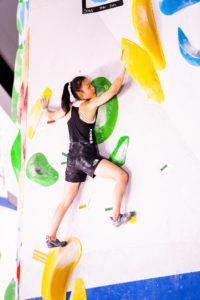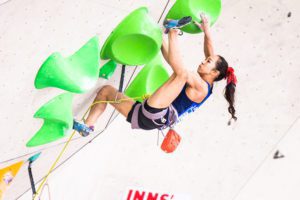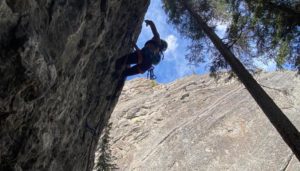Olympic Climbing Competition Promises to Surprise
Five factors that may mean these Games won't go according to script
 Photo by: Daniel Gajda of Kyra Condie
Photo by: Daniel Gajda of Kyra Condie
With Climbing’s Olympic debut around the corner, many questions will find their answers. The greatest of these surrounds the podium. Will this become the long-predicted coronation of Adam Ondra and Janja Garnbret? Could the Games be so easy to predict?

The unique nature of the Olympics separates it from other competitions. The Games have become the most prestigious showcase of sport, making new events’ Olympic debuts significant. Its infrequency raises the stakes, as many athletes might only qualify for a single Games in their career. Add along the mainstream Olympic reach, and the power of the platform becomes obvious. This event can change lives. From a sporting perspective, no greater stage exists.
The Olympic Games have a history of unsuspected results due to the pressure of the competition. Despite all predictions, the power of the stage can change any athlete’s headspace. Here are five reasons why Sport Climbing’s debut at the Olympics might not go the way everyone thinks.
Debut year means pressure is next level
Olympic pressure has a notorious history for shifting the odds. Take into account the additional history-making potential of a sport’s debut performance, and even the most hardened athletes begin to have trouble keeping their heads clear. Upsets have become characteristic of Olympic history. For Canadians, a familiar example comes from Triathlon’s debut at the 2000 Sydney Games. The then-unknown Canadian Simon Whitfield upset the presumptive favourite Simon Lessig from Great Britain. For a more recent example, a person needs to look no further than the current Games where the expected gold medallist Naomi Osaka lost out in her third match. She left the tournament empty-handed.

Combined format is still new
Even though the Combined format has taken place in a few World Championships, few athletes have experience with the discipline. Not many of the top competitors trained for the format until recently. This results from the untranslatability of Speed between the other disciplines. As such, it has not become clear who will excel at the Combined format. In a similar sense, few can predict the best strategies for an unprecedented event. Is it better to balance all three disciplines, or to play as much to one’s strengths as possible? Sean McColl has his game plan, but what route will others take in their quest for gold?
The Weather
Summer in Japan is hot, humid and sticky. This makes conditions poor and potentially changeable depending on the running order. Will that order have an effect on who makes it through to Finals? What if conditions change as the competition goes on? The humidity and heat will also present a challenge to competitors in maintaining their skin through the two gruelling rounds. The eventual victor might be the climber with the toughest skin. Another factor comes from each athlete’s ability to acclimate to heat. Will those use to climbing in hotter climates have an advantage? Ondra famously dislikes climbing in the heat, will the Czech favourite adjust?
Injuries and Overtraining
In order to compete at peak performance, athletes must arrive at the Games rested and healthy. Although this may seem obvious, arriving healthy and in good form each offers their own sets of challenges. All the climbers at these Games are seasoned competitors who know how to peak for big events. The allure of Olympic gold has a funny way of driving high-performance athletes to become more driven. This can result in progress or injury. We saw a number of competitors pull out of World Cups earlier this year due to injury. Jessica Pilz and Miho Nonaka each sustained legitimate injuries that they may recover from in time for the Games. Still, the time away from a perfect training cycle will have an effect. Even in these last weeks, it has become unclear who will make it to Tokyo healthy and who will climb through injury.

COVID Closures and layoffs
COVID delayed and disrupted not only these Games, but the careful build up that many of the competitors had planned. To that effect, some competitors have had to go without consistent access to climbing gyms, strength training facilities, physios, and more.
Add into the mix the extended break from high-level competitions that nearly all the competitors endured, and you have a recipe for surprise results.
It was speculated in the New York Times, that some mental health challenges the gymnastic superstar Simon Biles has dealt with owes partly to the lack of competition. “Almost no athlete does that, go for a year with no competition. There is no replacement, when all eyes are on you, and you need to be able to perform when the time is right.” Without the fire of competition to hone their edge, even the greatest will find they lack the sharpness they have become accustomed to.
At the Salt Lake City World Cups this year, more than a few competitors said they felt rusty. Some felt as though they made mistakes because of their absence from competition. With only a few World Cups since the onset of the pandemic, many without much Olympic-competitor participation, the speed each athlete finds their rhythm and returns to that crucial competition mindset will become important.



